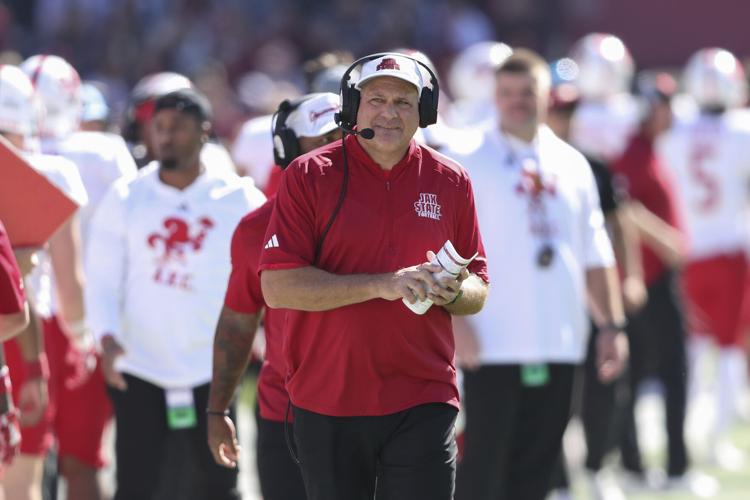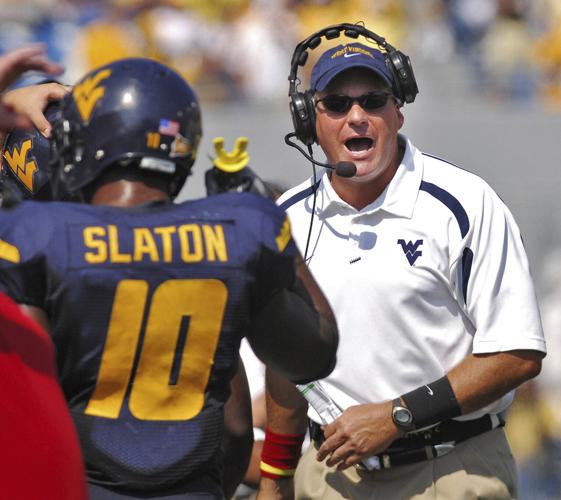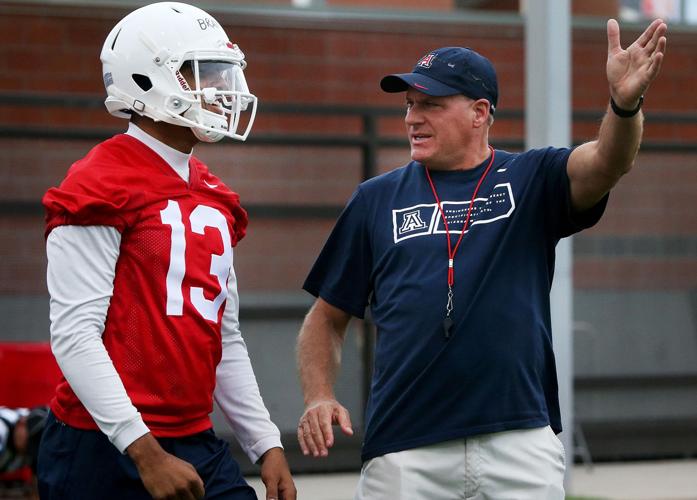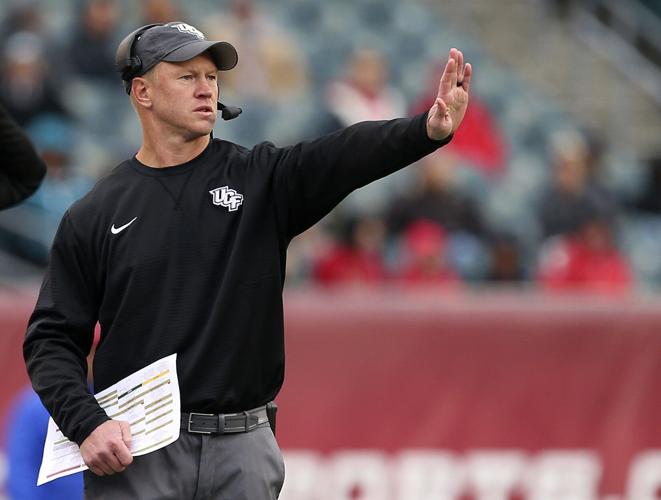In early August 2023, Arizona officially joined the Big 12 Conference. One of its incumbent members, West Virginia, was coming off its second consecutive sub-.500 season. Mountaineers coach Neal Brown appeared on hot-seat lists across the college football media landscape.
At that moment, those of us in the content business here in Tucson had a dream: West Virginia replaces Brown with Rich Rodriguez — former WVU and UA coach — and the Wildcats host the RichRod-led Mountaineers in Arizona’s inaugural Big 12 game in the fall of 2024.

Michael Lev is a senior writer/columnist for the Arizona Daily Star, Tucson.com and The Wildcaster.
That’s not exactly how it went. But we weren’t too far off.
Brown brought down the temperature with a 9-4 season in ’23 — only to backslide to 6-6 in ’24. West Virginia decided to move on — and to bring back its native son.
It became official Thursday morning: Rich Rodriguez is returning to Morgantown to coach the Mountaineers. It’s a proud moment for RichRod, his family and his supporters — and great for content in this market and throughout the Big 12 footprint. The only disappointment is that Arizona and West Virginia don’t face each other next season; their next meeting is slated for 2026.

Rich Rodriguez, shown coaching Jacksonville State vs. South Carolina in November 2023, is back in Power Four football with West Virginia, his alma mater. He’ll also be coaching in the same conference as Arizona, another of his former stops.
I talked to Rodriguez in October for a piece on his son, Rhett, who played quarterback for Catalina Foothills High School and the UA and began working for his father at Jacksonville State earlier this year. RichRod seemed happy at JSU, where he was in the midst of his third season as head coach. He seemed open to the possibility of returning to Power Four football — but wasn’t aggressively campaigning for it.
Two months later, here we are. Rodriguez, 61, is getting what’s likely a final shot at redemption at a place he’s intimately familiar with: RichRod grew up in West Virginia, played there and coached there.
In College Football Years, the latter happened eons ago. Rodriguez served as WVU’s head coach from 2001-07. He was at the forefront of the sport’s offensive revolution.
If you think the game has passed him by, well, you just haven’t been paying attention. Jacksonville State led Conference USA in scoring, total offense and rushing offense this season. JSU rushed for 386 yards in its 52-12 annihilation of Western Kentucky in the league championship game.

West Virginia coach Rich Rodriguez yells onto the field during the second half against East Carolina in this Sept. 22, 2007, file photo, in Morgantown, W.Va. The Mountaineers hired Rodriguez on Thursday for a second go-round at WVU.
RichRod can coach offense. Period. Full stop.
The Mountaineers most certainly will score points and accumulate yards under Rodriguez’s tutelage. Whether the program will flourish, overall, remains to be seen.
If WVU fans are expecting a return to the glory days of Pat White and Steve Slaton, they’ll probably be disappointed. The Mountaineers finished fifth in the final Associated Press poll in 2005, 10th in ’06 and sixth in ‘07. They won 32 games over his final three seasons in the now-defunct Big East. (The league still exists but no longer sponsors football.)
The Big 12 is twice the size (16 teams vs. eight) and has plenty of programs that are deeply invested in football. It won’t be easy. But it isn’t unreasonable to think Rodriguez can lead WVU to a string of 7-5/8-4 seasons with the occasional appearance in the conference title game.
That’s pretty much what he did at Arizona.
RichRod had his share of detractors during his time here, and the criticisms were mostly fair. One example: Arizona did not produce many NFL players during his tenure, and most of the ones who did make the league played on defense. Rodriguez didn’t need NFL-caliber talent to make his offense hum — or to win more games than he lost.

Former Arizona coach Rich Rodriguez, right, works with quarterback Brandon Dawkins during the first UA football practice of the season on July 31, 2017, in Tucson.
It’s hard to argue with the bottom-line results Rodriguez delivered here. He took over a program that went 4-8 in 2011 and immediately turned it into a regular postseason participant. The Wildcats qualified for five bowl games in Rodriguez’s six seasons and won three of them. They also played in the 2014 Pac-12 Championship Game.
That all sounds pretty good right about now, doesn’t it?
Rodriguez’s time here didn’t end well as he was fired for off-field reasons. Years later, a lawsuit stemming from the initial accusations of sexual harassment and hostile workplace conditions was dismissed.
We’re not going to relitigate any of that here today. It’s worth bringing up, though, because this is a redemption story for Rodriguez.
Or at least he hopes so. He also got fired after three seasons at Michigan, where he just wasn’t the right fit. The Wolverines did improve each season, going from 3-9 to 5-7 to 7-6, but Rodriguez was considered a failure in Ann Arbor.

West Virginia isn’t the only Big 12 school bringing back a former coach; UCF hired Scott Frost, who guided the Knights in 2016 and ‘17, including a 13-0 season.
After a year off, Rodriguez resurrected his career in Tucson. Who knows how his story would have ended here if he had two more seasons with Khalil Tate, who was born to play in RichRod’s system.
During our conversation in October, Rodriguez said his approach hadn’t changed much despite college football changing significantly.
“Build the program up, have a good time doing it, make an impact,” he said. “It’s a different job a little bit. But you have to establish a culture. Then the new guys have to come in and adapt to that culture.”
Simple yet profound. Kind of like RichRod’s offensive scheme.
West Virginia isn’t the only Big 12 school running it back and hoping it’ll work just as well the second time round. UCF hired Scott Frost, who, in his second and final season in Orlando (2017), guided the Knights to a 13-0 campaign. Frost then flamed out at Nebraska, his alma mater, going 16-31 in four-plus seasons.
There’s no guarantee the sequel will be a hit. But precedent does exist. Mike Riley thrived in his second stint at Oregon State.
Bill Snyder didn’t quite match his first go-round at Kansas State, but KSU still posted four seasons with nine-plus wins during his second chapter. Even the recently removed Mack Brown was hardly a flop in Round 2 at North Carolina, going 44-33.
Will RichRod 2.0 be a smashing success? It’s impossible to say.
But I do know this: It’ll be fun as hell to watch it play out.








